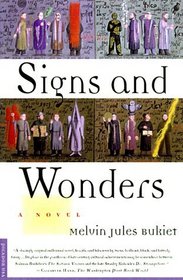Sparing no sensibilities in this searing, bitterly satirical novel, Bukiet reflects on the hypocrisy, venality, depravity, corruption and folly of which the human race is capable, and produces a harrowing story that is an eerie reprise of both the biblical account of Jesus' life and the Nazi extermination policy against Jews. On the eve of the millennium, during a storm of epic fury, a barge holding incorrigible criminals off the coast of Germany is swept loose of its moorings, trapping all the prisoners as it begins to sink. In one cell, 11 unsavory men imprisoned for horrifying crimes face certain death until their mysterious, silent cell mate, Ben Alef, saves them with what seems like a miracle. The astonished prisoners decide that Ben Alef is the Messiah come again, especially after he performs additional miracles. Soon a swell of believers, called Alefites, arises in Germany and around the world; worshipping their new deity, they express their spiritual freedom in wild sexual orgies. Naturally, the pope and other international leaders are appalled and work together to try to expose Ben Alef as a fraud; meanwhile, a fringe group of unscrupulous cynics manipulate him for their own gain. A series of shocking events ensues, culminating in a contemporary pogrom?a bloodbath on Christmas Eve in Hamburg. On New Year's Day 2000, in Europe's Disney World, a disciple's betrayal extinguishes the hope of salvation and signals the triumph of pure evil. Bukiet (After) handles language with supple skill, using sardonic humor and a jocular vernacular in his supremely ironic assessment of humanity's capacity for wickedness. Throughout the narrative he adroitly clothes his tragic message in the raiments of black comedy and farce. Some readers may find Bukiet's conviction that Jews will always suffer the fate of scapegoats too pessimistic. However, his message about spiritual rebirth destroyed by hatred rings with moral conviction
Book Reviews of Signs and Wonders
|
|
Signs and Wonders Author:
|




